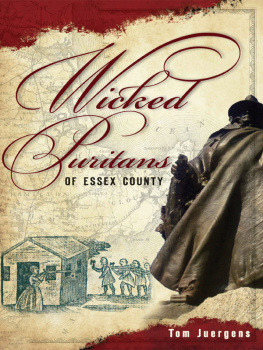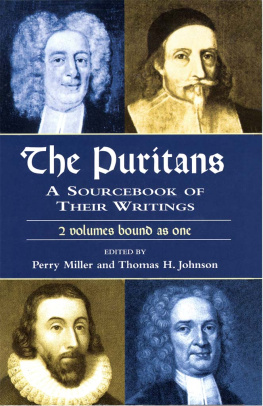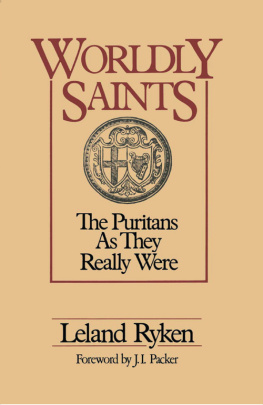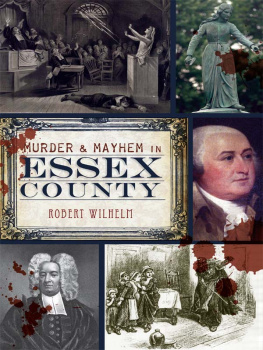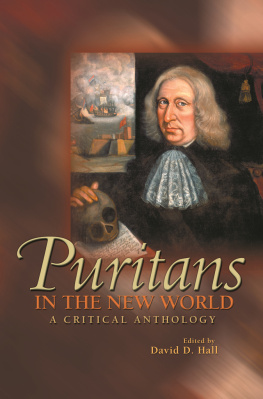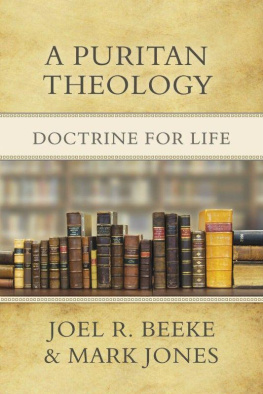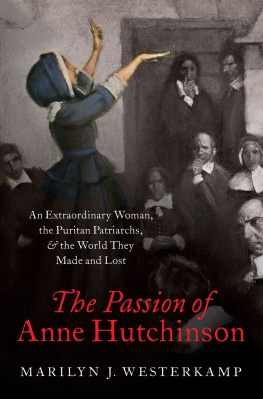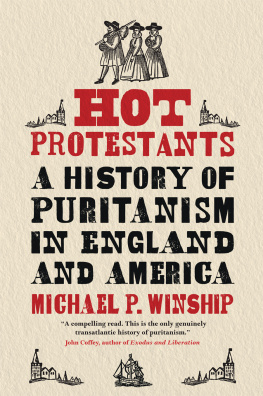

Published by The History Press
Charleston, SC 29403
www.historypress.net
Copyright 2011 by Tom Juergens
All rights reserved
First published 2011
e-book edition 2012
Manufactured in the United States
ISBN 978.1.61423.791.4
Library of Congress Cataloging-in-Publication Data
Juergens, Tom.
Wicked Puritans of Essex County / Tom Juergens.
p. cm.
Includes bibliographical references.
print edition ISBN 978.1.59629.566.7
1. Puritans--Massachusetts--Essex County--History--17th century. 2. Puritans--Massachusetts--Essex County--Biography. 3. Essex County (Mass.)--History--17th century. 4. Essex County (Mass.)--Church history--17th century. 5. Essex County (Mass.)--Social conditions--17th century. 6. Essex County (Mass.)--Biography. 7. Violence--Massachusetts--Essex County--History--17th century. 8. Corruption--Massachusetts--Essex County--History--17th century. I. Title.
F72.E7J84 2011
2010052257
Notice: The information in this book is true and complete to the best of our knowledge. It is offered without guarantee on the part of the author or The History Press. The author and The History Press disclaim all liability in connection with the use of this book.
All rights reserved. No part of this book may be reproduced or transmitted in any form whatsoever without prior written permission from the publisher except in the case of brief quotations embodied in critical articles and reviews.
For the always cheerful Michelle,
wife and ally,
with whom all things become possible.
Contents
Acknowledgements
Heartfelt thanks to everyone who offered information, insight, guidance, encouragement and reviews during the research and writing of this book. This includes everyone who was or is in my writing groups; the staffs at the American Antiquarian Society, the Massachusetts Historical Society and the Massachusetts Archives; and the librarians at the following libraries: Hamilton-Wenham, Ipswich, Beverly, Peabody Institute, Boston, Philips, Essex County Law and Social Law. I am also grateful for inspiration from friends and colleagues, including those who might mistakenly think they are forgotten. And, more than ever, for family members, immediate and otherwise. You all inspire and mean more to the lonely writer than can easily be put into words.
Introduction
The people in this book are not the sorts of characters usually found in books about colonial Massachusetts. They are mean and sneaky, deceptive and deadly. They are cheats, slavers and drunks. They are baby killers and viciously creative abusers of children, servants, animals and each other. They are long dead but are resurrected here to prove a point: all was not well in the New World, and there never was any such thing as the good old days, really.
This book is not about the Pilgrims, who broke clean from the Church of England and came off the Mayflower in Plymouth in 1620. It is about the Puritans, who came in a fleet of ships and landed in Boston and points north, including Salem, ten years later. The Puritans were more numerous, better educated and better off financially than the Pilgrims and had not left the church but sought to purify it from within. With a vengeance, as it turned out.
But first, a quick detour into the nature of early histories about the Massachusetts Bay Colony.
Before the word ethnocentric was coined, there was a tradition among old-time Massachusetts historians, an unspoken agreement to play up the colonists nobler qualities. That helped maintain the notion, quite appealing to the colonists descendants, those very historians among them, that if you could trace your lineage back to them, you had historical bragging rights, which came with a certain pedigree. Maybe even some sort of tacit superiority, however subtle and undefined, or at least as legitimate a claim to superiority as has ever been allowed by such a collection of egalitarians as Americans. The blueblood, eastern snob archetype had to start somewhere. And if there ever was any superiority, was it not logical that it stemmed from the colonists themselves, who were tough, stern and forbidding, yes, but also a notch above common human messiness and corruption, right? Somehow inherently good, if not better. That much was in a grade school lesson one day, wasnt it?
The current fashion for historians is to find and explore cracks in veneers, to turn mythic, idealized stereotypes over and poke their underbellies in search of the gritty stuff. And the most direct way to do that with the Essex Puritans is to read their criminal recordthe Records and Files of the Quarterly Courts of Essex County, covering 1635 to 1685which is the foundation of this book. Information from the Records and Files and from Records of the Court of Assistants, the high court in Boston for the most serious trials, is referred to in this book as simply the record or the criminal record. Excerpts from the Essex courts appear in unattributed quotes throughout. Quotes from the high court, and from other sources, are either immediately identified or in the endnotes, or both. When somethings worth is estimated, its value comes from contemporary probate records. Some quotes from individuals are rough going, antiquated and obscure, but there is real humanity in themat times you can almost see the court clerks shaking their heads as they record the proceedings. And for anyone linguistically inclined, its worth a cyber visit to the record for a taste of genuine colonial English.
The Records and Files nine volumes (over four thousand pages) reaffirm two things. First, the leaders of a theocracy will consider themselves Gods elect and will redefine what wickedness, intolerance and authority are all about. Second, the rank and file will live up to all the wickedness expected of it. Puritan judges, particularly big on authority, enjoyed the honorific worshipful and tolerated neither backtalk nor disparagement, in or out of court. In 1668, Thomas Wells, a ships carpenter, compared the Ipswich magistrates and court to the Inquisition house in Spain, [where] when a man is once brought into court he [knows] not for what [and is] as good [as] hanged, and got arrested for saying so.
The records rainbow of criminality scuttles any romantic notions about Puritan purity being a given, about the colonial period as a particularly virtuous time or about young Essex Countyor anywhere in New Englandas some bucolic nirvana where morality reigned supreme. Michael Zuckerman put it well in Peaceable Kingdoms:
Like any artifact of the imagination, the archetypical New England town has been tied only tenuously to the actual one. Its inhabitants have been reduced to caricatures of stolid virtue, folkloric figures impossible to conceive sniffling through the dismal winters or fornicating out back in the barn. To the local historians of New England, the town and its town meeting have always been more nearly objects of reverence than of research.
Not everyone under Puritan rule was a Puritan, but the record makes no distinctions, and the courts certainly didnt. But the majority of seventeenth-century Essex County residents were Puritans and tried, well, puritanically, if not quixotically, to live faultless, saintly lives. They are nearly as famous for that striving as their government was for its abhorrence of human frailty. The definition of wickedness changes over time, and this book casts the net wide to catch it in all its incarnations, old and new. It does that by including things that were once considered normal and are now considered wicked, or at least wrong, like slavery and corporal punishment, and by also including things that were once considered wicked and are now considered normal, like dancing and singing or wearing something extra nice. Back then, morality applied by law to just about everything, was policed by just about everyone and was consequently found to be transgressed just about everywhere. The morality crusade reached into the woods, orchards and fields; was carried to hearths and bedrooms; and justified peeping in others windows. Life was an unending opportunity to fall from grace, whether failing to aid a stranger in need or missing church, both chargeable offenses. Enforcing the code was a duty eagerly undertaken. Breaking it brought on everything from minor annoyances to one or more circles of hell.
Next page
